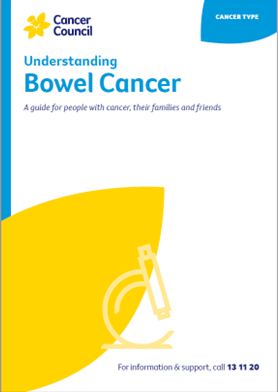- Home
- Bowel cancer
- Diagnosis
- Your health care team
Your health care team
Your general practitioner (GP) will arrange the first tests to assess your symptoms, or further tests if you have had a positive screening test. If these tests do not rule out cancer, you will usually be referred to a specialist, such as a colorectal surgeon or a gastroenterologist. The specialist will arrange further tests. If bowel cancer (also known as colorectal cancer) is diagnosed, the specialist will consider treatment options.
Often these will be discussed with other health professionals at what is known as a multidisciplinary team (MDT) meeting. During and after treatment, you may see a range of health professionals who specialise in different aspects of your care.
To find cancer specialists, multidisciplinary teams and hospitals in NSW or ACT, you can visit the NSW Government website CanRefer.
Health professionals you may see
| GP | assists you with treatment decisions and works in partnership with your specialists in providing ongoing care |
| colorectal surgeon | diagnoses bowel cancer; performs bowel surgery |
| gastroenterologist | diagnoses and treats disorders of the digestive system, including bowel cancer; may perform colonoscopy |
| radiation oncologist | treats cancer by prescribing and overseeing a course of radiation therapy |
| radiation therapist | plans and delivers radiation therapy |
| medical oncologist | treats cancer with drug therapies such as chemotherapy, targeted therapy and immunotherapy (systemic treatment) |
| cancer care coordinator | coordinates your care, liaises with other members of the MDT, and supports you and your family throughout treatment; care may also be coordinated by a clinical nurse consultant (CNC) or colorectal cancer nurse |
| nurse | administers drugs and provides care, information and support throughout treatment |
| stomal therapy nurse | provides information about surgery and can help you adjust to life with a temporary or permanent stoma |
| dietitian | helps with nutrition concerns and recommends changes to diet during treatment and recovery |
| genetic counsellor | provides advice for people with a strong family history of bowel cancer or with a genetic condition linked to bowel cancer |
| social worker | links you to support services and helps you with emotional, practical and financial issues |
| physiotherapist, exercise physiologist | help restore movement and mobility, and improve fitness and wellbeing |
| occupational therapist | assists in adapting your living and working environment to help you resume usual activities after treatment |
| counsellor, psychologist | help you manage your emotional response to diagnosis and treatment |
| palliative care specialist and nurses | work closely with the GP and cancer team to help control symptoms and maintain quality of life |
→ READ MORE: Bowel cancer treatment
Podcast for people affected by cancer
Listen now
More resources
A/Prof David A Clark, Senior Colorectal Surgeon, Royal Brisbane and Women’s Hospital, QLD, The University of Queensland and The University of Sydney; Yvette Adams, Consumer; Dr Cameron Bell, Gastroenterologist, Royal North Shore Hospital, NSW; Katie Benton, Advanced Dietitian Cancer Care, Sunshine Coast University Hospital and Queensland Health, QLD; John Clements, Consumer; Dr Fiona Day, Medical Oncologist, Calvary Mater Newcastle, NSW; Alana Fitzgibbon, Clinical Nurse Consultant, GastroIntestinal Cancers, Cancer Services, Royal Hobart Hospital, TAS; Prof Alexander Heriot, Consultant Colorectal Surgeon, Director Cancer Surgery, Peter MacCallum Cancer Centre, and Director, Lower GI Tumour Stream, Victorian Comprehensive Cancer Centre, VIC; Caitriona Nienaber, 13 11 20 Consultant, Cancer Council WA; Dr Kirsten van Gysen, Radiation Oncologist, Nepean Cancer Care Centre, NSW.
View the Cancer Council NSW editorial policy.
View all publications or call 13 11 20 for free printed copies.

